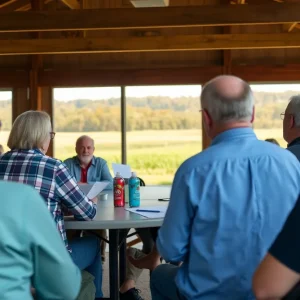Spartanburg, South Carolina – Richard Moore Executed After Legal Battle
Spartanburg, South Carolina, witnessed a significant event on Friday evening as Richard Moore, a 59-year-old convicted murderer, was executed. His execution took place following a series of legal challenges and pleas for clemency that were ultimately denied by state officials.
Who
Richard Moore had been on death row for over two decades after being convicted of murdering James Mahoney, a convenience store clerk, during a robbery in 1999. The case drew attention not only for the crime but also for the racial dynamics involved, as Moore is the last inmate sentenced to death by an all-White jury in South Carolina.
What
Moore was executed by lethal injection at 6:24 PM, making him the second inmate to be executed in the state after a 13-year hiatus from capital punishment. The execution followed the denial of his request for clemency by Governor Henry McMaster, who stated he would not commute Moore’s sentence.
Where
The execution was carried out at the South Carolina Department of Corrections facility in Spartanburg. This facility has been the site of previous executions, marking a return to lethal injections in the state after issues with obtaining necessary drugs delayed previous executions.
When
Moore’s execution occurred on the evening of April 21, 2023. This date followed the U.S. Supreme Court’s refusal to halt the execution just a day earlier, despite Moore’s claims of racial discrimination in his trial jury selection.
Why
The execution proceeded despite calls for mercy from various individuals, including two jurors from Moore’s original trial, the presiding judge, and former prison officials. These advocates stressed Moore’s remorse and the complexities surrounding his case. Moore himself expressed sorrow for his actions, stating in his final statement, “To the family of Mr. James Mahoney, I am deeply sorry for the pain and sorrow I caused you.”
Over the years, Moore and his legal team argued that the prosecutors had unfairly excluded Black individuals from the jury, a claim that gained national attention. His defense team noted that he faced an unarmed attack during the robbery, which they argued constituted self-defense.
In a significant statement to the press, Chrysti Shain, spokesperson for the South Carolina Department of Corrections, confirmed the execution and reflected on its implications in the ongoing discussions regarding capital punishment in the state. “This marks a pivotal moment for our procedures surrounding capital punishment,” she said, highlighting the state’s struggle to acquire lethal injection drugs which had led to a moratorium on executions for many years.
Context
Since the reinstatement of the death penalty in 1976, statistics reveal that more than 1,600 individuals have been executed nationwide, with a disproportionately high number being Black. According to recent data, Black individuals account for 34% of those executed, a number notably higher than their representation in the general U.S. population.
The controversy surrounding Moore’s case encapsulates broader issues of race and justice within the American legal system. As his family mourns the loss, advocates continue to challenge the fairness and morality of the death penalty, urging a reevaluation of its use in a system that claims to uphold justice and equality.
Conclusion
Moore’s execution echoes in the hearts of many who call for a reconsideration of capital punishment practices. As South Carolina looks ahead, one cannot help but wonder how this case will resonate in future legal debates and discussions on justice, race, and the death penalty.




























